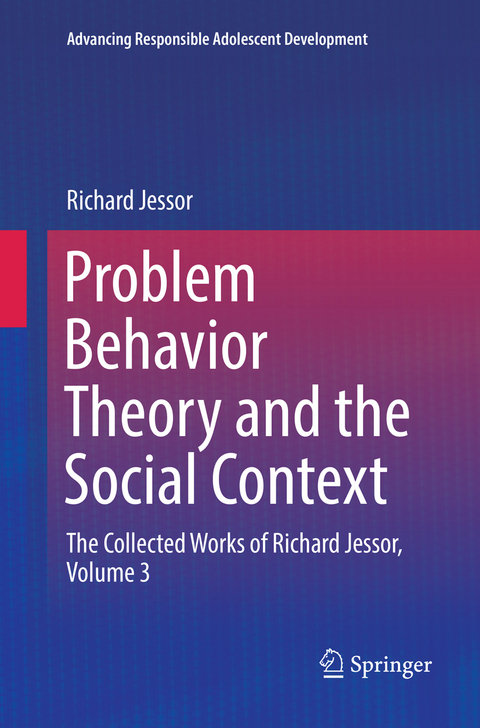
Problem Behavior Theory and the Social Context
Springer International Publishing (Verlag)
978-3-319-86274-3 (ISBN)
Topics featured in this volume include:
- Home-leaving and its occurrence among youth in impoverished circumstances.
- The continuity of adolescent developmental change.
- The impact of neighborhood disadvantage on successful adolescent development.
- Successful adolescence in the slums of Nairobi, Kenya.
- Explaining both behavior and development in the language of social psychology.
Problem Behavior Theory and the Social Context is a must-have resource for researchers, professors, clinicians, and related professionals as well as graduate students in sociology, social and developmental psychology, criminology/criminal justice, public health, and allied disciplines.
Richard Jessor, PhD, ScD, is Distinguished Professor of Behavioral Science and Professor of Psychology, Emeritus at the University of Colorado Boulder where he has spent his entire academic career. One of the founders of the university's Institute of Behavioral Science in 1959, he served as its Director from 1980 to 2001. He was Founding Director of the Institute's Research Program on Problem Behavior and, later, its Research Program on Health and Society. From 1987 to 1997, he also directed the Mac Arthur Foundation's Research Network on Successful Adolescent Development among Youth in High Risk Settings. He is the author or editor of 13 books and has published over 135 articles and book chapters. In 2003, he was designated a "Highly Cited Researcher" in the Social Science: General category by the Institute for Scientific Information. Educated at the College of the City of New York and Yale University, where he received his B.A. degree in Psychology in 1946, Jessor received an M.A. from Columbia University in 1947 and a PhD in Clinical Psychology in 1951 from Ohio State University, where he was a student of Julian B. Rotter. He has been a consultant to various federal agencies and private foundations as well as the World Health Organization, Health and Welfare Canada, and UNICEF. He has served on several National Research Council panels and on the Carnegie Council on Adolescent Development. He was an invited Fellow at the Center for Advanced Study in the Behavioral Sciences in 1995-96, and he received the Outstanding Achievement in Adolescent Medicine Award in 2005 from the Society for Adolescent Medicine. Jessor is, after 66 years, the longest-serving active faculty member at the University of Colorado. In May 2015, he was awarded the degree of Doctor of Science, honoris causa, by the Regents of the University of Colorado.
Chapter 1. Introduction to the Volume.- Section 1: Problem Behavior Theory and the Social Context of Disadvantage .- Chapter 2. "Making It" Among At-Risk Youth: The Role of the Social Context.- Chapter 3. Problem Behavior Theory and Success Despite Disadvantage.- Chapter 4. Social Context Protection and Risk in Adolescent Behavior and Development.- Chapter 5. Neighborhood Variation and Successful Adolescent Development.- Chapter 6. Problem Behavior Theory and Adolescent Problem Behavior in Sub-Saharan Africa.- Chapter 7. Successful Adolescence in the Slums of Narirobi, Kenya.- Chapter 8. Problem Behavior Theory and the Transition to Adulthood in the Slums of Nairobi, Kenya.- Section 2: Conceptual and Methodological Issues in Engaging the Social Context .- Chapter 9. The Perceived Environment as Social Context.- Chapter 10. The Perceived Environment and the Psychological Situation.- Chapter 11. Engaging Subjectivity in Understanding Individual Differences.- Chapter 12. Explaining Behavior and Development in the Language of Psychology.- Chapter 13. The Perceived Environment in Personality Variation.- Chapter 14. Continuity in Psychosocial Change from Adolescence to Young Adulthood.- Chapter 15. Restoring Context and Meaning in Social Inquiry: The Reach of Qualitative Methods.- Chapter 16. The Transdisciplinary Nature of Contemporary Behavioral Science.- Chapter 17. The Cross-National Generality of Theoretical Explanation.
| Erscheinungsdatum | 24.09.2018 |
|---|---|
| Reihe/Serie | Advancing Responsible Adolescent Development |
| Zusatzinfo | XI, 286 p. 32 illus. |
| Verlagsort | Cham |
| Sprache | englisch |
| Maße | 155 x 235 mm |
| Gewicht | 462 g |
| Themenwelt | Geisteswissenschaften ► Psychologie ► Entwicklungspsychologie |
| Studium ► Querschnittsbereiche ► Prävention / Gesundheitsförderung | |
| Recht / Steuern ► Allgemeines / Lexika | |
| Recht / Steuern ► Strafrecht ► Strafverfahrensrecht | |
| Schlagworte | Adolescent problem behavior in Sub-Saharan Africa • Adolescent resilience in Kenya • At-risk youth and social context • Behavioral science and environment • Cross-national research on adolescence • Development from adolescence to young adulthood • Ethnography and adolescent development • High-risk settings and successful adolescent devel • High-risk settings and successful adolescent development • Individual differences and subjectivity • Neighborhoods and adolescent development • Perceived environment and psychological situation • Perceived environment as social context • Phenomenological personality theories • Phenomenology and personality • Protective factors during adolescence • Reductionism in psychology • Risk factors during adolescence • Social contexts and adolescence in China • Social contexts and adolescence in the United Stat • Social contexts and adolescence in the United States • Transition to young adulthood in Kenya |
| ISBN-10 | 3-319-86274-X / 331986274X |
| ISBN-13 | 978-3-319-86274-3 / 9783319862743 |
| Zustand | Neuware |
| Haben Sie eine Frage zum Produkt? |
aus dem Bereich


